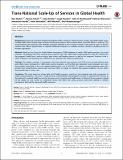| dc.contributor.author | Shahin, Ilan | |
| dc.contributor.author | Sohal, Raman | |
| dc.contributor.author | Ginther, John | |
| dc.contributor.author | Hayden, Leigh | |
| dc.contributor.author | Mossman, Kathryn | |
| dc.contributor.author | Parikh, Himanshu | |
| dc.contributor.author | McGahan, Anita | |
| dc.contributor.author | Mitchell, Will | |
| dc.contributor.author | Bhattacharyya, Onil | |
| dc.contributor.author | MacDonald, John Angus | |
| dc.date.accessioned | 2014-12-24T15:44:12Z | |
| dc.date.available | 2014-12-24T15:44:12Z | |
| dc.date.issued | 2014-11 | |
| dc.date.submitted | 2013-07 | |
| dc.identifier.issn | 1932-6203 | |
| dc.identifier.uri | http://hdl.handle.net/1721.1/92495 | |
| dc.description.abstract | Background
Scaling up innovative healthcare programs offers a means to improve access, quality, and health equity across multiple health areas. Despite large numbers of promising projects, little is known about successful efforts to scale up. This study examines trans-national scale, whereby a program operates in two or more countries. Trans-national scale is a distinct measure that reflects opportunities to replicate healthcare programs in multiple countries, thereby providing services to broader populations.
Methods
Based on the Center for Health Market Innovations (CHMI) database of nearly 1200 health programs, the study contrasts 116 programs that have achieved trans-national scale with 1,068 single-country programs. Data was collected on the programs' health focus, service activity, legal status, and funding sources, as well as the programs' locations (rural v. urban emphasis), and founding year; differences are reported with statistical significance.
Findings
This analysis examines 116 programs that have achieved trans-national scale (TNS) across multiple disease areas and activity types. Compared to 1,068 single-country programs, we find that trans-nationally scaled programs are more donor-reliant; more likely to focus on targeted health needs such as HIV/AIDS, TB, malaria, or family planning rather than provide more comprehensive general care; and more likely to engage in activities that support healthcare services rather than provide direct clinical care.
Conclusion
This work, based on a large data set of health programs, reports on trans-national scale with comparison to single-country programs. The work is a step towards understanding when programs are able to replicate their services as they attempt to expand health services for the poor across countries and health areas. A subset of these programs should be the subject of case studies to understand factors that affect the scaling process, particularly seeking to identify mechanisms that lead to improved health outcomes. | en_US |
| dc.language.iso | en_US | |
| dc.publisher | Public Library of Science | en_US |
| dc.relation.isversionof | http://dx.doi.org/10.1371/journal.pone.0110465 | en_US |
| dc.rights | Creative Commons Attribution | en_US |
| dc.rights.uri | http://creativecommons.org/licenses/by/4.0/ | en_US |
| dc.source | Public Library of Science | en_US |
| dc.title | Trans-National Scale-Up of Services in Global Health | en_US |
| dc.type | Article | en_US |
| dc.identifier.citation | Shahin, Ilan, Raman Sohal, John Ginther, Leigh Hayden, John A. MacDonald, Kathryn Mossman, Himanshu Parikh, Anita McGahan, Will Mitchell, and Onil Bhattacharyya. “Trans-National Scale-Up of Services in Global Health.” Edited by Jeremy D. Goldhaber-Fiebert. PLoS ONE 9, no. 11 (November 6, 2014): e110465. | en_US |
| dc.contributor.department | Massachusetts Institute of Technology. Media Laboratory | en_US |
| dc.contributor.department | Sloan School of Management | en_US |
| dc.contributor.mitauthor | MacDonald, John Angus | en_US |
| dc.relation.journal | PLoS ONE | en_US |
| dc.eprint.version | Final published version | en_US |
| dc.type.uri | http://purl.org/eprint/type/JournalArticle | en_US |
| eprint.status | http://purl.org/eprint/status/PeerReviewed | en_US |
| dspace.orderedauthors | Shahin, Ilan; Sohal, Raman; Ginther, John; Hayden, Leigh; MacDonald, John A.; Mossman, Kathryn; Parikh, Himanshu; McGahan, Anita; Mitchell, Will; Bhattacharyya, Onil | en_US |
| mit.license | PUBLISHER_CC | en_US |
| mit.metadata.status | Complete | |
